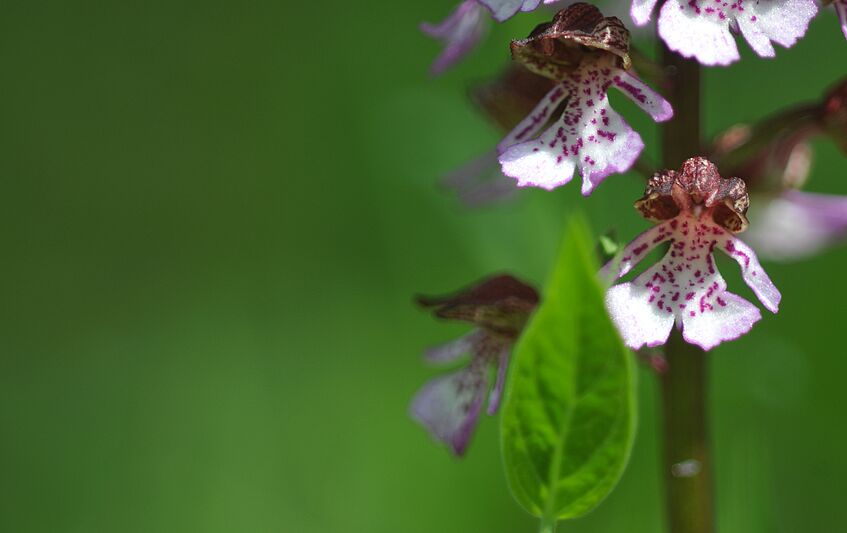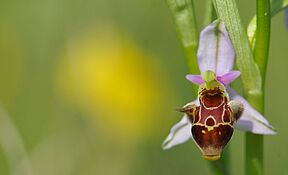Alexandros Amprazis, Department of Early Childhood Education, University of Western Macedonia, Florina, Greece
Renata Ryplova, Department of Biology, Faculty of Education, University of South Bohemia in Ceske Budejovice, Czech Republic
Download the description here.

© Peter Pany
Recording
Watch the recording of the workshop on Zoom (Code: 6Y.!z93a)
Description
Aims of this workshop:
- to clarify, that the proper understanding of plant role in human environment is essential part of any research instrument for assessment of plant awareness • to clarify how low plant awareness can be a substantive impediment to sustainable development, and how bringing plants to the forefront can foster the achievement of sustainable development goals
- to show, that improvement of the knowledge ( i.e. understanding the importance of plants reached via modern approaches of sustainable education) can influence student attitudes to plant and plant awareness at all
- to describe modalities through the correlation between the vegetal world and the 17 sustainable development goals can be clarified by researchers as a rich and valuable context for enhancing interest for plants and raising plant awareness.
Theoretical Background
Lack of plant awareness is an important phenomenon with a growing body of literature. Low human awareness of plants leads to low understanding of their role in our environment. This human illiteracy brings significant negative consequences creating barriers for sustainable development (as an example in-proper landscape management due to low human awareness of climatic function of vegetation leading to increase of further continental drought and torrential rains can be used). According to researchers, the educational system is listed both among the causes and solutions to this issue. Therefore, the restriction of this phenomenon can be considered as a challenge for academics, teachers and policy makers. In recent years there has been considerable interest in the relation between plant awareness and sustainable development (Amprazis & Papadopoulou, 2020; Ryplova & Pokorny, 2020; Lawrence & Calvo, 2023; Thomas et al., 2021). Ignoring flora seems to be an opposing factor to environmental balance and directly hinder the achievement of the vast majority of Sustainable Development Goals (SDGs). In that context, highlighting this link between sustainable development and plants seems vital for comprehending even more how plants interfere and define meaningfully human welfare. Additionally, the very framework of how plants contribute to the SDGs achievement can itself be an ideal learning direction for highlighting flora and raising plant awareness.
Methodologies involved
The workshop exploited case studies to engage participants with their peers in setting research goals upon flora’s role in sustainable development and raising plant awareness. Both quantitative and qualitative research approaches were present in the workshop. Additionally, all the principals of Education for Sustainable Development (Rieckmann, 2018) entered the equation as an established framework in which the nexus Plants-Sustainable Development was assessed. According to the above, the four research questions of the workshop were:
- Which are the ideal quantitative and qualitative research approaches for determining the link between Plants-Sustainable Development Goals and Limited Plant Awareness-Sustainable Development?
- Which are the key competencies in Education for Sustainable Development that can be used for fostering plant awareness?
- How to assess the comprehension of plant’s role in human environment in frame of any tool for plant awareness assessment?
- In what way can the understanding of plant importance via sustainable education affect students’ attitudes towards plants?
Outcomes
By the end of the workshop participants were expected to:
- Identify how plants contribute directly or indirectly to the achievement of all 17 Sustainable Development Goals
- Describe how ignoring flora can be an opposing factor to environmental balance and directly hinder the achievement of sustainable development
- Describe quantitative and qualitative research approaches that can be used for assessing plant awareness and its’ social, economic, and environmental impacts.
References
Amprazis, A., & Papadopoulou, P. (2020). Plant blindness: a faddish research interest or a substantive impediment to achieve sustainable development goals? Environmental Education Research, 26(8), 1065-1087.
Lawrence, N., Calvo, P. (2023). Learning to See ‘Green’ in an Ecological Crisis. In: L. Weir (Eds) Philosophy as Practice in the Ecological Emergency: An Exploration of Urgent Matters (pp. 167-183). Cham: Springer International Publishing.
Rieckmann, M. (2018). Learning to transform the world: Key competencies. In A. Leicht, J. Heiss, W.J. Byun (Eds) Education for Sustainable Development. Issues and Trends in Education for Sustainable Development (pp. 39–59). Paris, France: UNESCO.
Ryplova R. & Pokorny J. (2020). Saving Water for the Future Via Increasing Plant Literacy of Pupils. European Journal of Sustainable Development , 9(3), 313-323, doi.org/10.14207/ejsd.2020.v9n3p313
Thomas, H., H. Ougham, and D. Sanders. (2021). “Plant Blindness and Sustainability.” International Journal of Sustainability in Higher Education.


